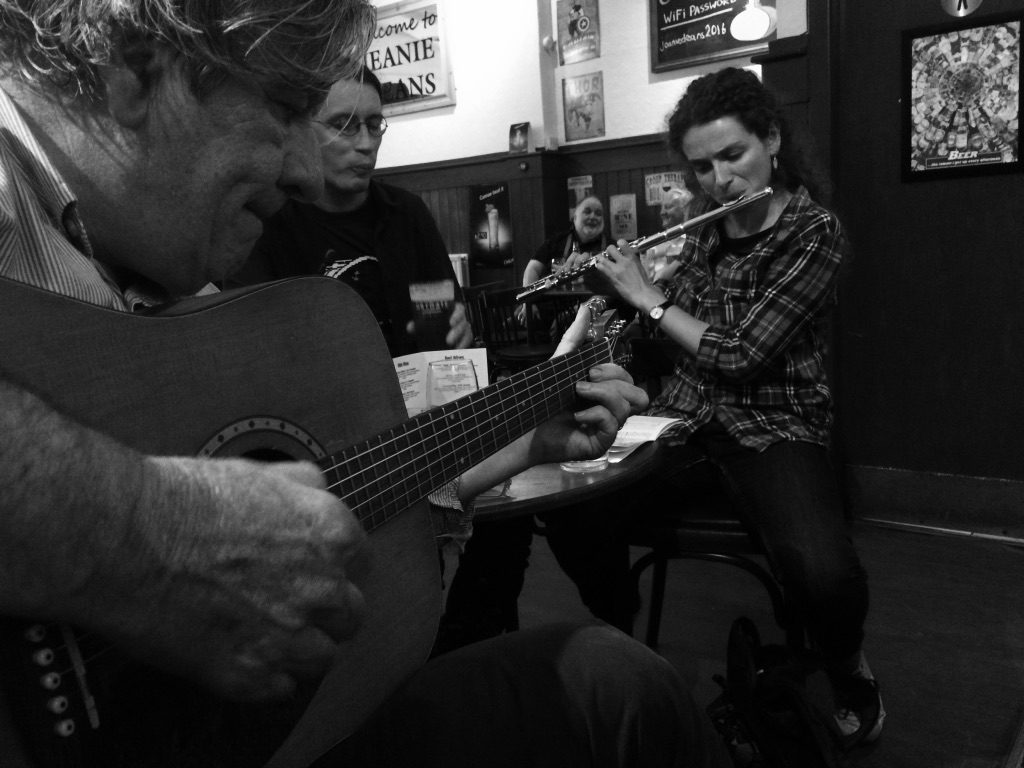FAQs
We are often asked about FluteFling workshops from those who haven’t attended before. Here are some of the most frequent ones answered.
Who is the workshop for? Do I need to play a wooden flute to attend?
The workshops are for people interested in playing traditional Scottish music on the flute, whistle or low whistle.
It is open to Boehm system (metal, classical) musicians and those playing simple system wooden flutes (keyed or unkeyed) alike. This is a great opportunity to explore and develop your flute playing in the context of Scottish traditional music, whichever instrument type you play.
Topics for all musicians include:
- different playing styles and approaches
- repertoire
- technique
- breathing, phrasing and tone improvement
- history
What about whistles? What sort should I have and is it a “come and try” type event?
Whistles and low whistles alike should be in the key of D. (Sometimes these are called soprano and tenor whistles.) It would be best if your whistle is tuneable too, but not essential. Ideally you should already have been playing the whistle for around 2 years and will have mastered scales and breathing while playing tunes and beginning to build up your repertoire. If in doubt, get in touch.
Unfortunately, our events tend not to be suitable for complete beginners. There are some beginner whistle classes in Edinburgh (Scots Music Group), Aberdeen (Scottish Culture and Traditions) and Glasgow (GFW) and elsewhere. This is something we would like to support more in the future. If in doubt, contact us first or sign up to the FluteFling newsletter to hear about our events.
I play the flute already, how do I know if I have the right amount of playing experience for the workshops?
There will also be space for Beginner flute players with up to 2 years experience as well as Impovers (with more than 2 years experience) and more Experienced players.
This is just a rough guide and there will be some flexibility in forming the classes. The tutors will support you in your music and make sure you have what you need in terms of developing your playing. If in doubt, please get in touch.
Scottish music on the flute? What’s that about anyway?
Not many people realise that the flute was once as popular an instrument in Scotland as the fiddle. Many of the older collections of Scottish music were published with the flute in mind. Read more about the flute in Scotland in this book review.
The popularity waned in the mid 19th Century for reasons that are not clear, but in recent years there has been a resurgence of interest. Flutes blend well with other traditional instruments in the Scottish music scene and have a natural affinity with whistles and the increasingly popular low whistles.
Sometimes we invite teachers from related traditions to help us create a better wider understanding of the flute and whistle in Scotland. FluteFling events are an opportunity for people to become part of the revival.
I learned flute at school but haven’t played traditional music on the flute before. Is this for me?
Absolutely! We welcome people returning to the flute after a break or from other flute traditions and will help with repertoire and technique so that you can play more comfortably with other traditional musicians.
I already play traditional flute/ whistle. Is there something for me?
The experienced tutors will share their knowledge and help you think further about your music, tone, phrasing and technique. People are inspired at these events and usually take something away that they want to work on further.
Learning by ear? What about sheet music?
Traditional music relies on developing a good ear. Our tutors will help you to develop those skills through teaching by ear. But not everyone will be used to this, so don’t panic if this seems daunting as we also have the music written out for you and will supply it in advance.
What should I expect at the sessions?
FluteFling sessions are friendly and informal affairs, with experienced musicians there to keep the music going and support whoever wants to start a tune. We haven’t had the need to put together session etiquette guidance, but this page by fiddler Ros Gasson has sensible advice. If in doubt, ask.
For repertoire, there isn’t a set list as such. However, tunes from The FluteFling Collection are likely to be played. Additionally, John Crawford put together a North East tunes PDF that Gordon Turnbull has recorded as a project. Find out more about this and download the PDF here.
So who usually attends?
The weekend brings musicians of different backgrounds and locations together and has led to friendships and connections between people from around Scotland and beyond. Some are picking up their instrument after a break, others much more involved in their local scenes. We’ve had flute players from the Isle of Arran, Argyll, Dumfries and Galloway, the Scottish Borders, Aberdeenshire, Stirlingshire, Perthshire, Lancashire, France, Germany, Sweden and the USA. We have also had people attending online from Ireland, France, Spain, Canada and Japan. We hope you can come and join us.

